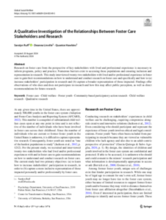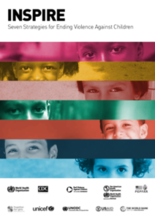Displaying 131 - 140 of 14551
Midwife Siro Devi is one of several Indian midwives who were regularly pressured to murder newborn girls in India's district of Katihar during the 1990s. In this story, she is reunited with Monica, a child who was saved by Siro and her fellow midwives after being abandoned as a baby during this same period.
This U.S.-based study aimed to get recommendations from stakeholders with lived and/or professional experience in foster care to understand how to increase participation in research and how to capture a broader representation of those impacted.
A South Korean commission found evidence that women were pressured into giving away their infants for foreign adoptions after giving birth at government-funded facilities where thousands of people were confined and enslaved from the 1960s to the 1980s.
This paper explores the involvement of children in discharge of care applications and the tensions children’s guardians and other stakeholders may face when aiming to both uphold children’s rights to participate and their right to protection from harm.
The Chinese government is ending its intercountry adoption program, and the U.S. is seeking clarification on how the decision will affect hundreds of American families with pending applications.
Hope and Homes for Children, Lumos, Save the Children and Plan International, Transform Alliance Africa, together with the UN OHCHR are inviting children and young people to participate in online, oral consultations on the theme of Care and Support. The purpose of the consultation will be to gather inputs to help inform an expert workshop on the topic of care and support, which will be held in late in 2024 at the United Nations.
UNICEF has now issued a Request for Proposals in order to select a supplier for the provision of Baseline Evaluation of Ukraine Better Care Reform. Learn more about how to bid.
All under-18s have now been removed from Scotland's young offenders institutions and transferred to more child-friendly settings. The change follows suicides of young people while detained and the passage of a new law that bans children being sent to prison.
This article holds the State as responsible for the wellbeing of those it has taken the responsibility of protecting. These include people who have suffered violence, indignity, hunger and life-threatening circumstances. The five-year planning of state and district plans have utilised more resources than produced outcomes and output. In this article we put together a learning from strategies that can facilitate duty holders to emerge as more responsible actors during the pandemic that continues.




